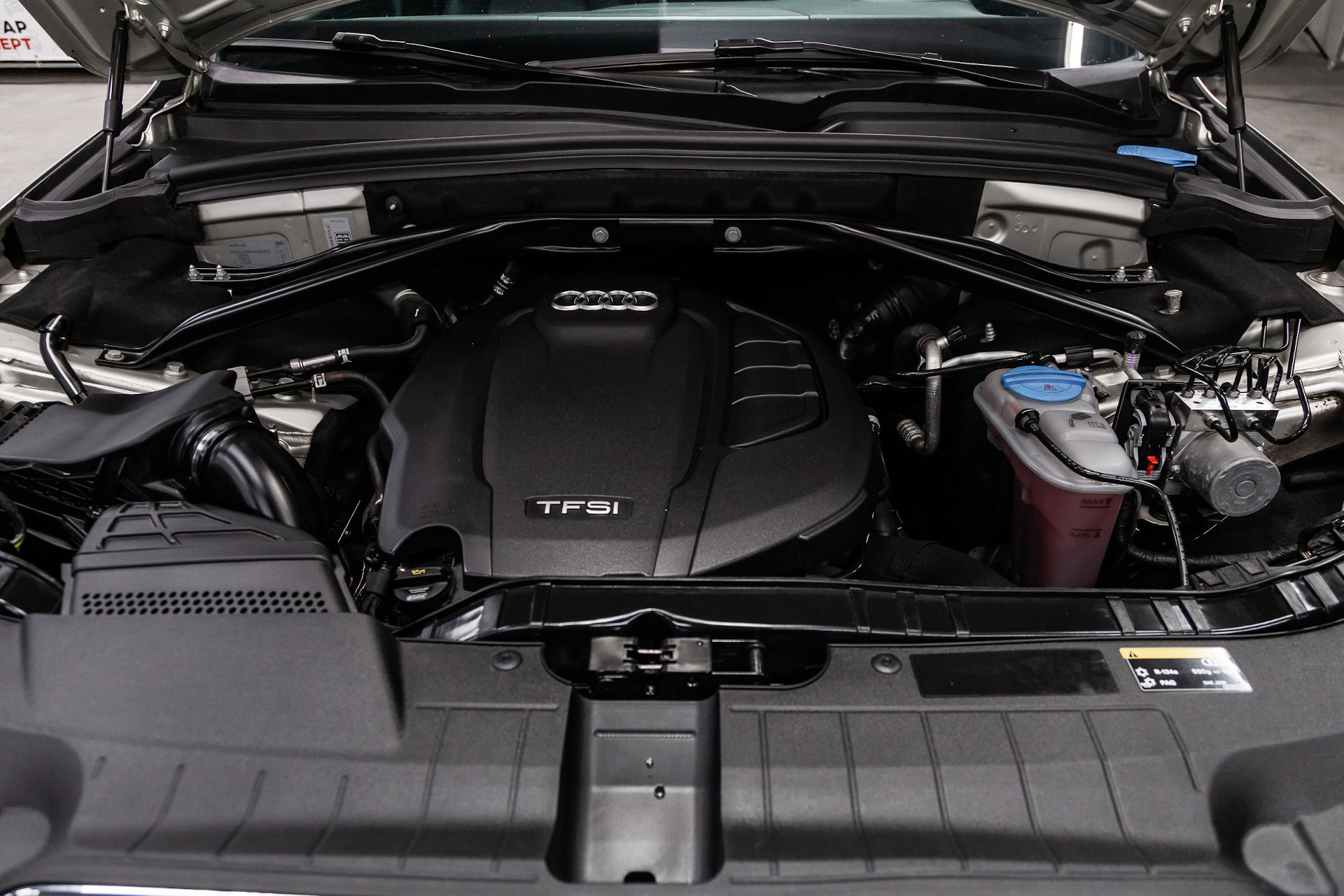Scheduled maintenance is the term used to describe various maintenance procedures carried out at set intervals, either at a particular mileage or date (whichever comes first).
Earlier cars, Audis included, required servicing far more often than the cars of today. Even as late as the 1990s and early 2000s, scheduled maintenance carried out at intervals of 8,000 and 12,000 kilometres (depending on the model), were the norm. However; by the early 2000s, the frequency of servicing was able to be drastically reduced to as little as once every 2 years with the innovative variable service schedule concept. (More on this later.)
However, for the Audi Q5 owner who has chosen the fixed service schedule, it is based on the average driver clocking up approximately 15,000km each year. But even if that figure isn’t reached over the course of 12 months, Audi recommends that the Q5 on the fixed service schedule be serviced at least once annually.
Aside from the financial savings of fixed service intervals being extended to 15,000km, it has also benefited the environment enormously, through the drastic reduction in the amount of waste oil generated by Audi vehicles each year.
Many of us are familiar with the traditional 10,000km or 6 monthly service, so wondering how Audi has managed to stretch this out to 15,000km and beyond is a valid question. The answer to this lies in the game-changing introduction of long-life engine oil; the lifeblood of every internal combustion engine. It was a joint Audi and Volkswagen initiative around the turn of the century that saw a number of mineral oil companies commissioned with developing a synthetic oil capable of handling an increased service interval.
The result: an engine oil boasting superior anti-wear properties, with more reliable engine protection over an increased timeframe.
The introduction of long-life oil was revolutionary and the effects of it far-reaching. Firstly, it significantly reduced the regular maintenance costs associated with engine oil changes for Audi drivers. But aside from the financial savings of fixed service intervals being extended to 15,000km, it has also benefited the environment enormously, through the drastic reduction in the amount of waste oil generated by Audi vehicles each year.
Reducing the amount of services also required other components being upgraded to match the durability of the new and improved synthetic oil. Audi drivers would kick up a stink – and rightfully so, if their vehicle still had to present to a workshop for other checks despite oil not needing to be changed. So, Audi engineers as always; rose to the challenge. A maintenance-free car battery was introduced, as well as sensors to alert the driver of items that previously required a physical check. Tyre pressure sensors and an engine oil level sensor, just to name a couple.
What Does An Audi Q5 Service Include?
But back to the maintenance of the Q5 – with the Audi service schedule whittled down to once every 12 months, it is even more crucial that these services are not skipped or postponed through negligence or forgetfulness. Regular servicing has always been a key ingredient when discussing the reliability and longevity of any car and the award winning Q5 is no exception.

No service is complete without a professional road test by a competent technician. The car will be smoothly put through its paces, so that engine and transmission performance, as well as suspension, steering and braking systems can be assessed.
Every owner’s manual or service book contains a basic checklist for what is covered at each maintenance interval, with the relevant service page always completed and stamped after each service. Not only does this enable the owner to keep a detailed service record, it also adds to the resale value of the car down the track.
Available online is the Audi Service Interval document which gives a fantastic overview of when and how often serviceable items are replaced throughout the car’s life. It covers both diesel and petrol models. Bear in mind, that many of the components listed have both a mileage replacement schedule and/or a maximum timeframe. This is simply because not all wear patterns of components correlate directly to the odometer reading. Take brake fluid for example – Audi, like most car manufacturers, specify that it should be changed every 2 years – regardless of distance travelled. This is because brake fluid absorbs moisture over time, which negatively impacts its ability to perform at its peak under high temperature scenarios like heavy braking. Put more simply – water in brake fluid lowers its boiling point, increasing the risk of brake fade (loss of stopping power).
However, once a Q5 is entrusted into the capable hands of the qualified technicians at Audi, a lot more is done than a visual fluid level check and mechanical inspection. Every square inch of the car is gone over with a fine-tooth comb to ensure any potential issues are addressed long before they become a problem. This normally begins with the car being connected to an Audi diagnostics computer which scans for past and current fault codes. The Audi technician assigned the service may also be tasked with ensuring any outstanding campaigns or safety recalls are done at the same time.
In addition to the points mentioned above like the various fluids being replaced at their predetermined intervals; no part of the car escapes the high level of scrutiny that accompanies the once humble oil change. Basic inclusions in every service involve the lubrication of door and bonnet hinges, as well as sunroof guide rails and boot hinges. Lights and wipers are all systematically run through their functions right down to glovebox compartment illumination to ensure everything is in working order.
No service is complete without a professional road test by a competent technician. The car will be smoothly put through its paces, so that engine and transmission performance, as well as suspension, steering and braking systems can be assessed.
In addition to the final, comprehensive road test, a short road test will often be conducted prior to the technician starting work on the vehicle. One of the main reasons for this, is that it gives an opportunity for anything out of the ordinary to be addressed whilst the car is already on the hoist undergoing the routine service, rather than discovering it on the final road test.
Safe to say, the most noticeable difference to the Audi driver upon collection of the vehicle is of course the immaculate presentation of the car post-service, thanks to the complimentary wash and interior clean, courtesy of Audi dealerships the world over.
Audi Scheduled Maintenance
Scheduled maintenance is the term used to describe various maintenance procedures carried out at set intervals, either at a particular mileage or date (whichever comes first). Audi also has a long life/variable schedule which allows for up to 30,000km or 2 years between oil changes on Audis fitted with petrol engines – whilst diesel engines have an upper limit of up to 50,000km between services, also being capped at a maximum of 2 years.
Variable or flexible servicing is an alternative to fixed interval servicing. With variable servicing selected, the vehicle computer receives inputs from a number of sensors in order to calculate when a service is due; rather than simply activate the service reminder at a set interval or date. Choosing between variable or fixed servicing all comes down to personal preference, as both have their advantages.
Many components have both a mileage replacement schedule and/or a maximum timeframe. This is simply because not all wear patterns of components correlate directly to the odometer reading.
The advantage of variable intervals is clearly the potential to significantly reduce servicing costs if the car is driven in a way which extends the service interval time. And to keep things simple, under extreme conditions the service reminder will revert to the minimum or fixed service interval of 15,000km.
Extreme conditions are commonly associated with regularly driving in very hot or dusty climates, which in one sense is correct. But some of the most extreme conditions an engine operates under are frequent short trips where the distance travelled is so little that the engine doesn’t have time to reach optimal operating temperature. An example of this could be if a vehicle is used primarily for short trips to the shops, or the daily drop off / pick up run to a nearby school.
Factors that could extend the variable service reminder beyond 15,000km are things like if the vehicle computer detects a high percentage of highway kilometres. Sensors will constantly relay information back to the onboard computer which evaluates inputs such as distance travelled, fuel consumption and the associated oil temperature curve to calculate a variable service interval. In diesel engines there is an additional engine oil ‘soot load’ calculation; which measures the average number of soot particles in the oil. This is needed as diesel engines produce far more soot during the combustion process than a petrol engine. Obviously, most of it does exit the engine on the exhaust stroke, but some soot does inevitably end up polluting the oil as it bypasses the piston rings.
What Brand Of Oil Does Audi Recommend?
The Audi Q5 oil specifications can be found in the owner’s manual. Audi specifically mentions Castrol Edge as its recommended oil. For the record, the Audi oil quality standard for Q5 petrol engines is VW 504 00. For Q5 diesel engines, Audi’s oil quality standard is VW 507 00. (On a side note, the petrol SQ5 has a different standard: VW 508 00.)
Both of these are a 5w30, fully synthetic oil and if for some reason Castrol Edge is not available, there are a number of other of brands whose oils match the above specifications.
It was a joint Audi and Volkswagen initiative around the turn of the century that saw a number of mineral oil companies commissioned with developing a synthetic oil capable of handling an increased service interval.
Information on which standards the oil meets is listed on the container label, but if in doubt, every local Audi dealer will have approved oil in stock which is available for purchase.
Related: Audi Q7 Oil Type
Is Audi Q5 A Reliable Car?
As a new car, the Audi Q5 is definitely one of the more reliable European compact luxury SUVs, despite it not scoring as highly in average running cost comparisons as that of its closest rivals. When it comes to overall build quality and interior finish – the Audi Q5 is in a class of its own and the various warranty options available for the first few years, ensure stress free ownership.
The first thing to do when considering a used Q5 on the other hand, is to ensure any relevant safety recalls have been carried out on it.
Another way to sound out the reliability of a particular year model Q5 is by trawling the Audi online forums, which cater for the first-time Audi driver, right through to the avid enthusiast. As these cars age with time, more and more information is becoming available to provide potential Q5 buyers with increasingly comprehensive data. It always pays to make an educated purchase with a cool head rather than buying on impulse; when armed with the knowledge of what to look out for in higher mileage examples, potentially expensive pitfalls can be avoided.
Typically, cars in the luxury segment are more prone to electronic components letting them down, due to the advanced technology they feature, so as with any used car purchase, time spent researching the model in question is invaluable.
When adequate homework is combined with a thorough pre-purchase inspection by an impartial third party, such as the NRMA – it can also result in a pre-owned Audi providing many years of trouble-free motoring.
Information and advice in this article is general in nature and current at the time of publication, and no warranty is offered as to its accuracy or completeness.


